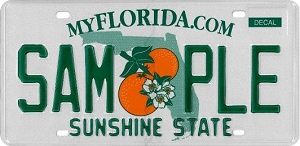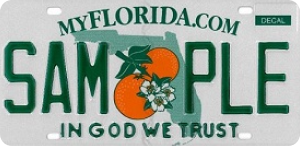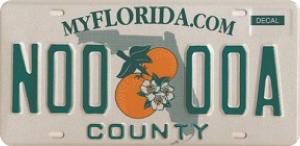A Florida license plate lookup enables individuals to obtain essential information about a vehicle and its owner using the license plate number, but this access is contingent upon having a valid reason. This tool is commonly used to verify ownership, check a vehicle’s accident history, or report dangerous driving.
In Florida, where there are over 21.5 million registered vehicles and about 400,000 accidents annually, it serves as a valuable resource for ensuring vehicle safety and accountability. Users can obtain information such as title records, service history, and ownership details. The lookup system helps Floridians make informed decisions when buying, selling, or investigating vehicles.
Why Run a License Plate Search in Florida?
There are several important reasons to run a license plate search in Florida, including:
- Identifying a vehicle when the VIN (Vehicle Identification Number) isn’t available
- Conducting pre-purchase due diligence, especially when buying from a private seller or online
- Accessing detailed vehicle records, accident history, service history, or checking if the vehicle was reported stolen
- Verifying if a vanity or personalized license plate is available for registration
- Checking for odometer rollback or a salvage title
- Assisting towing or insurance companies in identifying the owner of an abandoned or damaged vehicle
- Checking for any active recalls on the vehicle
- Reporting bad drivers or leaving public comments on forums or platforms
Is it Legal to Perform a License Plate Lookup in Florida?
It is legal to perform a license plate lookup in Florida, as vehicle records are generally considered public records under the Florida Public Records Law, specifically outlined in Chapter 119 of the Florida Statutes. The types of information available to the public include the vehicle's make, model, year, registration status, title history, and any liens.
However, personal details like the social security number, address, and phone number are protected under Florida’s privacy laws and the federal Driver Privacy Protection Act (DPPA). Access to this information requires a legally recognized purpose, including:
- Government and law enforcement functions
- Motor vehicle safety and theft issues
- Business verification of customer information
- Legal proceedings
- Research and statistical reporting
- Insurance-related activities
- Notifying owners of towed/impounded vehicles
- Licensed private investigators and security services
- Commercial driver's license verification
- Private toll transportation facility operations
- Uses with individual's express consent
- Bulk distribution with express consent
- Uses with written consent from the individual
- State-authorized uses related to motor vehicles or public safety
Misusing license plate information or violating DPPA regulations can lead to legal penalties, including liquidated damages for each violation, revocation of access, and reporting to authorities. Violators may face fines or lawsuits under both federal and state laws.
How Can You Conduct a Florida License Plate Lookup?
In Florida, individuals can obtain vehicle information through license plate numbers using the following options:

Florida Highway Safety and Motor Vehicles (FLHSMV)
Conducting a Florida license plate lookup requires some effort, as the Florida Highway Safety and Motor Vehicles (FLHSMV) does not currently provide an online service for retrieving vehicle information using only license plate numbers. However, individuals seeking this information have several options available to them.
One approach is to contact the FLHSMV Customer Service at (850) 617-2000. Their representatives can guide interested parties on available services and assist with vehicle information requests.
For those who prefer in-person assistance, visiting a local motor vehicle service center is a viable option. At these centers, individuals can request a license plate lookup by providing necessary details to a clerk. Visitors should bring identification and be prepared to explain their reason for the lookup.
Individuals should regularly check the official FLHSMV website to stay informed about any changes in available services. This ensures they have access to the most up-to-date information and resources regarding license plate lookups and other vehicle-related services in Florida.

Approved NMVTIS Data Providers
While the FLHSMV doesn't offer direct online license plate lookups, several approved National Motor Vehicle Title Information System (NMVTIS) data providers offer vehicle history reports using plate numbers. These services include GoodCar.com, InfoTracer.com, Recordsfinder.com, and StateRecords.com.
These platforms compile data from both private and public databases, providing comprehensive vehicle history reports for a fee. The information typically includes details about the vehicle's ownership history, accident reports, vehicle issues, and other relevant data. However, the depth and accuracy of information may vary between providers.
What Information Can You Obtain from a Florida License Plate Lookup?
A Florida license plate lookup can provide a range of information depending on whether it is a basic search or a comprehensive report.
A basic license plate search typically provides the following vehicle-related details:
- Vehicle make (e.g., Toyota, Ford)
- Vehicle model (e.g., Corolla, Mustang)
- Year of manufacture
- Vehicle type (e.g., sedan, SUV, truck)
- Drive type (e.g., front-wheel, rear-wheel, all-wheel drive)
- Transmission type (e.g., automatic, manual)
- Engine type (e.g., V6, electric, hybrid)
- Manufacturer's Suggested Retail Price (MSRP)
Meanwhile, a more detailed report provides additional, extensive information about the vehicle, such as:
- Record of any reported accidents involving the vehicle
- Information on past services or repairs performed on the vehicle
- History of the vehicle’s mileage to check for any odometer rollbacks
- Any active recalls on the vehicle due to safety concerns
- Title status (whether the vehicle has a clean, salvage, or rebuilt title
- Details of previous states or locations where the vehicle was registered
- Information if the vehicle has been reported stolen
- Data on whether the vehicle was declared a total loss or salvaged
It is worth emphasizing that personal information such as the address, phone number, and Social Security number is protected under the DPPA and Florida Statute Section 119.0712 (2).
Only authorized parties with a permissible use under the law—such as law enforcement, insurance companies, or those with written consent from the owner—can access this data.
How Much Does Vehicle Registration Cost in Florida?
Florida license plates feature a vibrant design that includes a map of the state with a citrus orange backdrop and the text "MYFLORIDA.COM" at the top. The state offers three standard license plate options: the county name plate (which may not be available in all counties), the “Sunshine State” plate, and the “In God We Trust” plate.
Each license plate consists of six characters, following specific patterns such as PQ1 2RS, PQR S12, P12 3QR, and 12P QRS.




License Plate Types in Florida
In Florida, different types of license plates are available, each with unique identifiers and requirements, which can influence the license plate lookup process. The major categories include:
Each plate type may have specific regulations impacting access to associated vehicle records.
Frequently Asked Questions (FAQs)
Below are some FAQs on Florida license plate lookups:
- Can I Look Up FL License Plates for Free?
Individuals can perform a free Florida license plate lookup from authorized sources. However, these services typically offer limited information, such as basic vehicle details. In contrast, paid lookup services provide comprehensive reports, including ownership history and liens. While free options are convenient, paid services offer a more in-depth understanding of the vehicle.
- Do All Florida License Plate Lookups Work for Custom or Personalized Plates?
While standard lookups provide detailed vehicle information, vanity plates may have limitations, such as fewer details available for certain customizations. For additional information on custom plates, individuals should contact a local motor vehicle service center or use specialized online services designed for tracking custom plate details.
- How Long Does a Typical Florida License Plate Lookup Take?
A typical Florida license plate lookup is usually processed within a few minutes if done online. However, requests through mail or in-person visits may take longer, potentially several days. The speed of the lookup can also depend on the specific service used, whether free or paid, and the accuracy of the information provided.
- Can I Perform Bulk License Plate Lookups in Florida?
In Florida, individuals can perform bulk license plate lookups, but strict regulations apply. Organizations must possess a valid purpose and comply with the DPPA (Driver Privacy Protection Act). Typically, bulk requests require a Memorandum of Understanding (MOU) with the FLHSMV to ensure data usage aligns with legal guidelines.
- Are There Any Alternatives to a License Plate Lookup for Obtaining Vehicle Information in Florida?
Alternatives to a license plate lookup for obtaining vehicle information in Florida include using the FLHSMV's Vehicle Information Check system, which requires either the title number or VIN (Vehicle Identification Number). Individuals can also request vehicle records by completing and submitting the HSMV 90510 form (Motor Vehicle, Vessel, and Mobile Home Records Request).
Additionally, authorized websites such as GoodCar.com, InfoTracer, Recordsfinder.com, and StateRecords.org provide comprehensive vehicle history reports through a VIN check.
